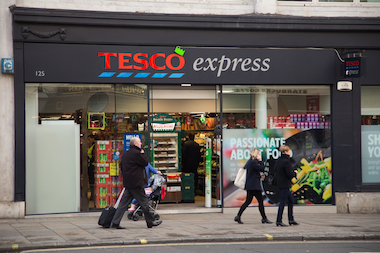Tesco cuts staff pension scheme

Axing of retailer’s generous staff pension scheme is one of a number of changes announced by the retailer to recover financial losses
Jermaine Haughton
Britain’s leading supermarket Tesco will no longer offer its generous pension scheme as the retailer’s executives shake up the business to cut its costs.
The retailer’s management plans to close its defined-benefit pension scheme to new members as it attempts to recover from Tesco’s worst ever-financial year in 2014. The company is still reeling from the astonishing accounting scandal last year which wiped £2bn from its share value and the loss of market share to cheaper rivals including Lidl and Aldi.
With a deficit of £3.4bn, the company’s famous generous pension scheme will be one of the first to fall under the axe, despite having 350,000 members, including 203,000 current Tesco workers.
A consultation looms – but it seems likely that the move will affect existing participants in the pension scheme rather than just new entrants. Adrian Jones, national officer for trade union Unite, told the Western Morning News: “Our members who deliver day in day out for Tesco, many of whom have done so for a great number of years, are now extremely concerned about their futures.”
It is not uncommon, in times of financial discomfort, for companies to adopt an austere approach, but for a company which has led its industry for at least a decade, the forthcoming year promises to provide the ultimate test of chief executive Dave Lewis’ hands-on management to see whether he can halt the losses and push away circulating competitors.
John Lewis and Standard Life are just a few of the other large UK employers who have cut their respective staff pensions, further narrowing the number of schemes on offer in the private sector. A combination of economic factors, such as low inflation and an uncertain stock markets, and the longer life expectancy of staff, have made the scheme too expensive for many companies, analysts say.
Since the end of 2013, the deficits of workplace defined benefit schemes have risen by 66% according to JLT Employee Benefits’ monthly index because of sinking bond yields. Collectively UK private sector schemes had a deficit of £249bn on December 31, 2014 from the £150bn recorded at the end of 2013.
Despite being one of the largest private pension schemes in the country, Tesco paid £542m in the last financial year just to service the programme. Furthermore, Tesco’s obligations under the defined benefit pension scheme are more than £11bn.
Dave Lewis, chief executive of Tesco, said: “We have some very difficult changes to make. I am very conscious that the consequences of these changes are significant […] but we are facing the reality of the situation. Our recent performance gives us confidence that when we pull together and put the customer first we can deliver the right results.”
The supermarket will close down its Cheshunt office and turn Welwyn Garden City into its UK and group centre. It is also to close 43 of its worst performing stores to save it £300 million initially and a further £250 million a year. The cost-cutting strategy includes selling-off its Asian operations, its online film, music and TV streaming business Blinkbox, Tesco Bank and its data business Dunnhumby.
Nevertheless, the retail giant’s Christmas performance will give Lewis hope of a much more successful 2015, as sales over the holiday period were only down 0.3% year-on-year, and up 0.1% if fuel sales are included. In the last quarter of 2014, sales were down by 2.9%, compared to the 5.4% fall recorded in the previous three months. These results were helped by Lewis’s move to cut prices and increase the number staff in its supermarkets during the festive season..
Image of Tesco store courtesy of Shutterstock

Press & Media Enquiries
For more information or to request interviews, contact CMI's Press Team on 020 7421 2705 or email press.office@managers.org.uk


